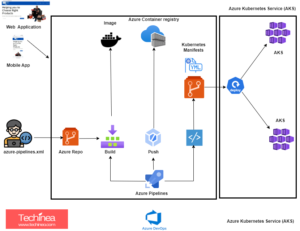Platform engineering is a discipline focused on designing, building, and maintaining the foundational infrastructure and services that enable software development and delivery within an organization. It involves creating platforms, frameworks, tools, and automation to support developers, operations teams, and other stakeholders throughout the software development lifecycle.
Key aspects of platform engineering include:
-
Infrastructure as Code (IaC): Platform engineers leverage infrastructure as code principles to manage and provision infrastructure resources programmatically. They use tools like Terraform, Ansible, or CloudFormation to define infrastructure configurations in code, enabling consistent, repeatable, and automated deployments.
-
Cloud Computing: Platform engineers design and manage cloud environments, leveraging services provided by public cloud providers such as AWS, Azure, and Google Cloud Platform. They architect scalable, resilient, and cost-effective solutions using cloud-native technologies like containers, serverless computing, and managed services.
-
Continuous Integration/Continuous Deployment (CI/CD): Platform engineers implement CI/CD pipelines to automate software delivery processes, from code commit to production deployment. They configure build automation, test automation, and deployment automation tools like Jenkins, GitLab CI/CD, or CircleCI to enable rapid and reliable delivery of software updates.
-
Containerization and Orchestration: Platform engineers work with containerization technologies such as Docker and container orchestration platforms like Kubernetes to package, deploy, and manage applications in a scalable and portable manner. They design containerized architectures and implement Kubernetes clusters to orchestrate containerized workloads effectively.
-
Monitoring and Observability: Platform engineers set up monitoring, logging, and observability solutions to monitor the health, performance, and security of applications and infrastructure. They configure tools like Prometheus, Grafana, ELK Stack (Elasticsearch, Logstash, Kibana), or Datadog to collect and analyze metrics, logs, and traces for troubleshooting and optimization.
-
Security and Compliance: Platform engineers implement security best practices and compliance standards to protect data, applications, and infrastructure assets. They design secure network architectures, configure access controls, encrypt sensitive data, and implement identity and access management (IAM) policies to mitigate security risks and ensure regulatory compliance.
-
Automation and Self-Service: Platform engineers develop automation scripts, tools, and self-service portals to streamline infrastructure provisioning, configuration, and management tasks. They empower development teams to provision resources on-demand, reduce manual intervention, and increase productivity through automation.
-
Developer Experience (DevX): Platform engineers focus on enhancing the developer experience by providing easy-to-use, self-service platforms and tools. They create developer-friendly documentation, tutorials, and training materials and offer support and guidance to help developers leverage platform capabilities effectively.
In essence, platform engineering plays a critical role in enabling organizations to build, deploy, and operate modern software systems efficiently and at scale. By designing robust, reliable, and scalable platforms, platform engineers empower development teams to focus on building innovative products and delivering value to customers



